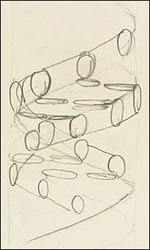 Quite surprisingly, Michael Crichton has an excellent op-ed in the Sunday Times on the insane overreach of US patent law, the limits of which are to be tested today before the Supreme Court. In dispute is the increasingly common practice of pharmaceutical companies, research labs and individual scientists of patenting specific medical procedures or tests. Today’s case deals specifically with a basic diagnostic procedure patented by three doctors in 1990 that helps spot deficiency in a certain kind of Vitamin B by testing a patient’s folic acid levels.
Quite surprisingly, Michael Crichton has an excellent op-ed in the Sunday Times on the insane overreach of US patent law, the limits of which are to be tested today before the Supreme Court. In dispute is the increasingly common practice of pharmaceutical companies, research labs and individual scientists of patenting specific medical procedures or tests. Today’s case deals specifically with a basic diagnostic procedure patented by three doctors in 1990 that helps spot deficiency in a certain kind of Vitamin B by testing a patient’s folic acid levels.
Under current laws, a small royalty must be paid not only to perform the test, but to even mention it. That’s right, writing it down or even saying it out loud requires payment. Which means that I am in violation simply for describing it above. As is the AP reporter whose story filled me in on the details of the case. And also Michael Crighton for describing the test in his column (an absurdity acknowledged in his title: “This Essay Breaks the Law”). Need I (or may I) say more?
And patents can reach far beyond medical procedures that prevent diseases. They can be applied to the diseases themselves, even to individual genes. Crichton:
…the human genome exists in every one of us, and is therefore our shared heritage and an undoubted fact of nature. Nevertheless 20 percent of the genome is now privately owned. The gene for diabetes is owned, and its owner has something to say about any research you do, and what it will cost you. The entire genome of the hepatitis C virus is owned by a biotech company. Royalty costs now influence the direction of research in basic diseases, and often even the testing for diseases. Such barriers to medical testing and research are not in the public interest. Do you want to be told by your doctor, “Oh, nobody studies your disease any more because the owner of the gene/enzyme/correlation has made it too expensive to do research?”
It seems everything — even “laws of nature, natural phenomena and abstract ideas” (AP) — is information that someone can own. It goes far beyond the digital frontiers we usually talk about here. Yet the expansion of the laws of ownership — what McKenzie Wark calls “the relentless abstraction of the world” — essentially digitizes everything, and everyone.
